
All the teams across UP Education work hard to keep our campuses running. Everyone contributes to making the student experience the best it can be. Each Up Education team below explains how we all work together, for the success of our students.
Human Resources (HR) also known as the People & Culture team ensures the staff/people within the UP Education whānau are supported whilst they are employed with NZMA.
People and Culture is a term that refers to the management of human resources in our organisation. It encompasses a range of activities that are designed to support and develop the all of the people who work in our organisation, including recruitment, onboarding, performance management, training and development, employee engagement, and employee relations.
The aim of People and Culture is to create a work environment that enables us all to perform at our best and achieve our full potential. This involves creating policies and practices that support diversity and inclusion, employee well-being, and work-life balance. It also involves promoting a positive and productive workplace culture that encourages collaboration, creativity, and innovation.
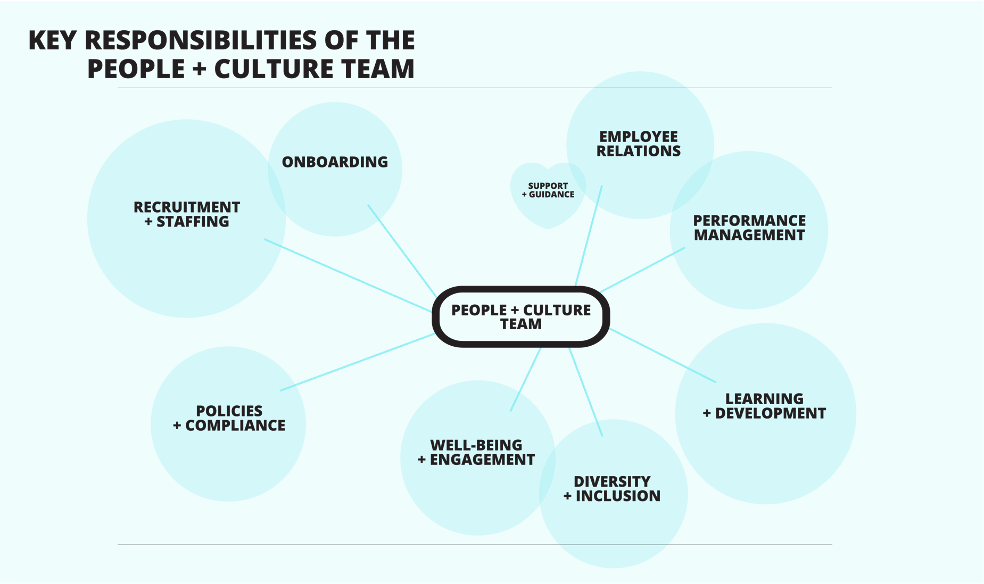
The People and Culture team at UP Education work hard to ensure an engaging and seamless employee experience, including onboarding new staff. This team manages the recruitment process and supports us to recruit high performing and passionate staff. They are the drivers of diversity and inclusion initiatives and support health and safety of our campuses and people. They support us all with any query or concern we might have.
Some of the key responsibilities of the People and Culture team are:
- Recruitment and staffing: Managing the recruitment process, including creating job descriptions, posting job vacancies, screening candidates, conducting interviews, and making job offers.
- Onboarding and orientation: Developing and delivering orientation programmes for new employees, which may include introducing them to the culture and values of our organisation, providing information on policies and procedures, and ensuring that they have the tools and resources they need to be successful.
- Employee relations: Providing support and guidance to employees on workplace issues such as conflict resolution, performance management, and employee grievances.
- Learning and development: Developing and implementing training programmes that support the professional development and career advancement of employees.
- Performance management: Developing and implementing performance management systems and processes, including goal setting, performance reviews, and feedback mechanisms.
- Diversity and inclusion: Developing and implementing strategies to promote diversity and inclusion in the workplace, including training and development programmes, recruitment strategies, and policies that support diversity and inclusion.
- Well-being and employee engagement: Developing and implementing programmes that promote employee well-being, such as employee assistance programmes, health and wellness initiatives, and employee engagement surveys.
- HR policies and compliance: Developing and implementing HR policies and practices that are in compliance with relevant legislation and regulations, including policies related to equal employment opportunity, workplace health and safety, and data privacy.
Our People and Culture team plays a critical role in managing the human resources of our organisation, and in creating a workplace culture that is supportive, inclusive, and conducive to employee success and well-being.
BambooHR

BambooHR is a cloud-based human resources (HR) software that is designed to simplify and automate some of these processes. It provides a comprehensive suite of tools for various HR needs, like managing employee data, managing recruitment and managing policies.
We use Bamboo for all our HR (People and Culture) information and tasks.
When you log into BambooHR from the NZMA homepage you will see:
- My Info:
Here is a central repository for storing all employee information, including personal details, job history, performance data, job related documents (CV, contracts) and more. - People:
Here you will find org charts of all areas of UP Education, you can search for a person by name and see what their role is and where they fit into our organisation. - Hiring:
If you are a hiring manager, the Hiring area allows you to review applicants CVs and communicate with the candidates. - Files:
Here you will find important UP Education Group People Policies:- AntiBullying, Harassment and Discrimination
- Working from Home
- Security
- Domestic Violence Employee Protection
- Student Interaction and ethical behaviour
- Information Security Policy
- Staff privacy
- Code of Conduct
- Performance and Misconduct
- Leaving the organisation
- Drug and Alcohol
- Acceptable Use/li>
- Health and Safety
- Leave Entitlement and Procedure
- Modern Slavery;
- Travel Policy and Procedures
- Diversity, Inclusion and Wellbeing (DI&W)
- Recruitment Policy
- Expense Management
---> 🔵 CLICK to view these Policy Documents: BambooHR files

Overview of Marketing
The main goal of the Marketing team is to provide information to prospective students about studying at our UP Education schools, whether that is via campaigning (advertising), our websites or creating collateral (like our school prospectuses). This has a large impact on the type of students we get on our campuses.
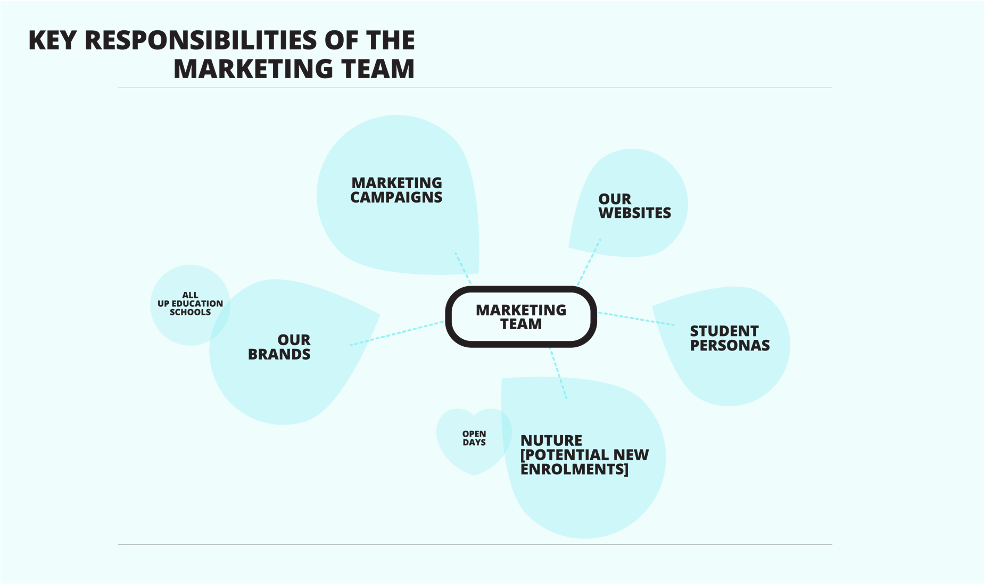
At UP Education, our Marketing team covers the following:
- Creating marketing campaigns: Both digitally and offline, to drive leads (prospectus students) for the enrolment team to convert to a student. This includes all campaign creative, website look and feel, campaign optimisation, website functionality to capture prospectus student details and subsequent nurture journeys developed through Marketo, including events and open days.
- Our brands: As guardians of the brand the Marketing team are responsible for developing and evolving our brands. They can provide you with Brand Guidelines, logo’s and fonts, as well as advice on how to use them. They are also responsible for development of collateral, like our school's prospectuses.
- Student Personas & Communities: The Marketing team are responsible for determining who our students are, this includes development of Student Personas for each campus and for each course, as well as Student Communities (groupings of Student Personas) to help identify who our students are, so we can find more of them.
- Website: The Digital team within the Marketing team are responsible for the functionality, and content of our websites.
- Nurture: The Digital team also look after Marketo — the platform we use to nurture leads (potential new enrolments) and students. A large part of this is supporting our campus Open Days from a registration and nurture perspective.
- New Product Development insights: When we develop a new programme, the Marketing team can assist with information on who the target market are, what demand there is for this programme, and what competitors are offering, as well as whether it aligns with our personas.
Student Stories
The Marketing team are always on the hunt for student success stories for our company social media platforms. They also would love to have any great student work to showcase on our websites for current and prospective students.
If you have a student that has achieved notable success during or after their study, or your students have produced some amazing work, please let your Campus Manager know.
Sales Overview
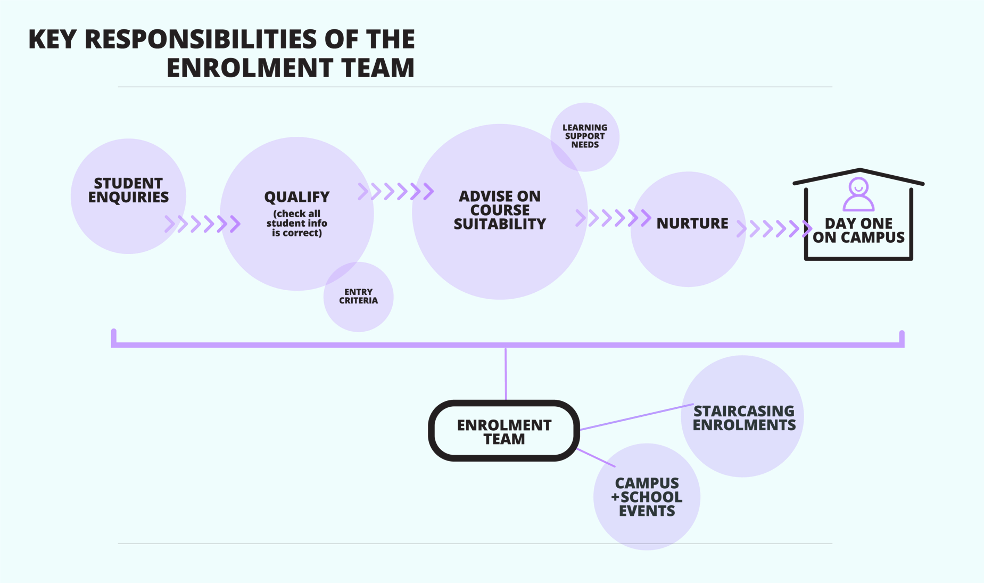
What is the main goal of the Enrolment team/Course Advisors?
The Course Advisors (Enrolment Team) works hard to enrol great students into programmes that will help them achieve their study goals as they align with their study and career aspirations.
Our Process
The UP Education Enrolment team are primarily responsible for following up the enquiries from prospective students who may wish to study at one of our schools. This involves responding to enquiries, qualifying (checking the students's details) the prospective student to ensure they meet the entry criteria, identify any learning support required at time of enrolment and ensuring they are enrolling in a course of study that best suits their needs and career aspirations, and then nurturing the enrolments until they join their class!
In addition to this activity, this team support the Community Engagement team with events and expos, and also support the Campus team with staircasing enrolments (students moving to the next level of a programme).
The Enrolment team work hard to ensure we have enough classes filled with students, on each campus. This means our campuses continue to operate effectively. They are passionate about delivering great education to our students.
Key challenges for this team
The biggest challenge for the Enrolment team is ensuring a balance between enrolling enough students to allow classes to go ahead while still maintaining the quality of students they enrol and then implementing a solid nurture plan for each student to ensure they are connected to campus life early and often, leading up to Day 1 of their programme of study. This means they are ensuring students and tutors are set up for success.
What is the most important thing we can do to help the Enrolment team?
Enrolments do not happen in isolation! The Enrolment team is just part of the big team that makes us one of the best places in New Zealand to gain an education. When the tutors deliver amazing learning experiences the students tell their friends and family and word spreads that we are the place to go!
Tutors also make a large contribution to this by helping out with student staircasing (students enrolling in the next programme once their programme is complete), Open Days, Orientations, industry events and on campus nurture events for new and/or existing students, this all helps to establish an awesome environment for students and all our staff.
Domestic Students
Domestic students are New Zealand citizens or holders of a residence class visa (there are other minor categories of domestic students).
---> 🔵 CLICK to read more about Domestic students in New Zealand.
Domestic students make up the majority of our students. In New Zealand there are many choices of places to study, so when students chose one of our NZMA campuses, it is an honour and we work hard to make every step of it an awesome and memorable experience.
Some of the steps a domestic student will run through before they start their programme of study with us:
- Research and selection: Domestic students interested in enrolling in tertiary study, usually begin by researching their options and selecting an institution that offers the programme and courses they are interested in.
- Application: Once a student has selected us, they will need to submit an application. The application process may include providing academic transcripts, proof of English language proficiency (if required), and other documentation.
- Acceptance: If the student meets the admission requirements/entry criteria for the programme, they will receive an offer of acceptance from us. The entry criteria is different for each programme and is determined by the programme approval.
- Enrolment: To confirm their place in the programme, the student must now complete the enrolment process. This may involve paying a deposit, providing additional documentation.
- Orientation: Once the enrolment process is complete, the student will attend an orientation either on Day One of the programme or prior. Orientation provides information about the school and campus, its policies and procedures, and the support services available to students.
- Payment: Domestic students in New Zealand may be eligible for government fees free, funding and subsidies, depending on their circumstances and the programme they are enrolled in.
International Students
International students are an important part of our student body. These students bring a diversity of perspectives and experiences to our schools, and can enrich the learning environment for all students. International students go through many steps to join our schools, and there are a multitude of countries and schools for them to choose from, the Enrolment team works very hard to support these students.
Here are some key facts about international students in New Zealand:
- Numbers: According to statistics from the New Zealand Qualifications Authority (NZQA), there were approximately 75,000 international students enrolled in New Zealand private tertiary institutions in 2020, making up around 32% of the total enrolments.
- Nationalities: International students come from a wide range of countries, with China, India, and South Korea being the top three countries of origin in New Zealand.
- English language proficiency: International students are generally required to meet minimum English language proficiency requirements to be eligible for enrolment in a New Zealand programme of study. International students are required to sit the IELTS test and provide a minimum score. IELTS is The International English Language Testing System and is graded on a scale of 1-9.
- Visa requirements: International students are required to hold a valid student visa to study in New Zealand. The visa requirements include meeting health and character requirements and demonstrating sufficient funds to support themselves during their study.
- Support services: Tertiary institutions in New Zealand generally provide a range of support services to international students, including orientation programmes, academic and pastoral support, accommodation assistance, and cultural integration programmes. All New Zealand tertiary institutes adhere to the Education (Pastoral Care of Tertiary and International Learners) Code of Practice 2021.
- Economic impact: International students contribute significantly to the New Zealand economy through the payment of tuition fees, accommodation costs, and living expenses. In 2020, international education was New Zealand's fourth-largest export sector, contributing over $5 billion to the economy.
International students need to follow many steps to enrol in one of our schools, our International Enrolment team is there to support them in this process:
- Research: The first step for international students is to research tertiary institutes in New Zealand that offer the programmes they are interested in studying. This may involve reviewing our website, reading online reviews and rankings, and consulting with education agents or other trusted sources.
- Admission requirements: Once an international student has identified that they are interested in attending, they will need to review the programme of study's admission requirements to ensure they are eligible to apply. This may include meeting minimum academic requirements, English language proficiency requirements, and any other specific programme prerequisites.
- Application process: The application process for international students typically involves completing an online application form and providing supporting documents such as academic transcripts, English language test scores, and a personal statement. There may also be an interview or additional testing as part of the application process.
- Acceptance: Once the application has been reviewed, we notify the student of their acceptance or rejection. If the student is accepted, they will receive an offer letter outlining the conditions of their enrolment, including tuition fees and other costs.
- Visa application: International students are required to obtain a student visa to study in New Zealand. We provide the necessary documentation to support the student's visa application, including an offer of place and confirmation of enrolment.
- Arrival and orientation: Once the student has obtained their visa and made travel arrangements, they will typically attend an orientation programme at the school they are enrolled in, to learn about the school and campus, its policies and procedures, and the support services available to international students.
Tell me about Student Fees
DQ Funding
The Deliver and Qualification funding (DQ) is a type of government funding provided by the New Zealand Tertiary Education Commission (TEC) to support the delivery of specific tertiary qualifications and courses. DQ funding is intended to incentivise tertiary education providers to deliver high-quality programmes and courses that align with industry needs and promote student achievement.
DQ funding is based on the number of equivalent full-time students (EFTL) enrolled in each programme or course, and is paid to the institution in instalments throughout the year. The funding is intended to cover the direct costs of programme delivery, such as faculty salaries, course material and equipment.
To be eligible for DQ funding, tertiary education providers must meet certain criteria, including being registered with the New Zealand Qualifications Authority (NZQA) and having their programmes and courses accredited by relevant industry bodies. Providers must also demonstrate that they have effective systems in place for monitoring and reporting on student achievement.
Fees Free?

Fees Free in New Zealand is a government initiative that provides eligible domestic students with one year of free tertiary education. The programme was introduced in 2018 and is intended to make tertiary education more accessible and affordable for students.
Under the Fees Free NZ programme, eligible students can have their first year of tertiary study fees waived, up to a certain amount. The programme covers a wide range of tertiary courses and qualifications, including certificates, diplomas, and degrees.
To be eligible for Fees Free NZ, students must meet certain criteria, including being a New Zealand citizen or permanent resident who has finished secondary school in the past three years, or who is over the age of 19 and has not previously studied at tertiary level.
The programme is intended to help reduce the financial burden of tertiary study, and to encourage more students to pursue further education and training.
How much does Fees Free cover?
Fees Free NZ covers up to 120 credits per academic year of tertiary study. The exact amount of fees covered will depend on the total cost of the programme or course, as well as the number of credits that make up the programme.
For example, if a student is enrolled in a programme that consists of 120 credits in total, and the total cost of the programme is $12,000, then Fees Free NZ would cover the full cost of the programme. However, if the programme consists of 180 credits and has a total cost of $18,000, then Fees Free NZ would cover the cost of the first 120 credits, and the student would be responsible for paying the remaining $6,000.
It's important to note that Fees Free NZ only covers tuition fees, and does not cover other costs associated with tertiary study, such as course materials, textbooks, accommodation, and living expenses.
International Student Fees
International students generally pay more for tertiary study in New Zealand than domestic students because they do not have access to the same government funding and subsidies as domestic students.
In New Zealand, the government provides funding to public tertiary institutions to help support the cost of education for domestic students. These institutions are also required to offer a proportion of their places to domestic students at a lower cost or free of charge. However, this funding is not available to international students, who must pay the full cost of their education.
In addition to tuition fees, international students may also need to pay for additional expenses such as international student insurance, visa fees, and travel expenses. Private tertiary institutes in New Zealand may also charge additional fees for support services and other resources that are provided to international students.
It is important to note that while international students may pay more for their education in New Zealand, they are still making a significant contribution to the economy through the payment of tuition fees and other expenses. Furthermore, many private tertiary institutes in New Zealand provide a range of support services and resources to help international students succeed academically and socially, including orientation programmes, academic and pastoral support, and cultural integration programmes.
What is StudyLink?

StudyLink is a government agency in New Zealand that provides financial assistance to eligible students who are pursuing tertiary education. The agency is responsible for administering a range of student loans, allowances, and scholarships, and helps students to manage their financial obligations while studying.
---> 🔵 CLICK to go to the Studylink website.
Some of the services and support provided by StudyLink include:
- Student loans: StudyLink administers the student loan scheme, which provides eligible students with loans to help cover the cost of tuition fees and living expenses while studying.
- Student allowances: StudyLink provides financial support to eligible students who need help with living costs while studying, such as accommodation, food, and transport.
- Scholarships: StudyLink administers a range of scholarships that are available to eligible students, including those with academic, sporting, or cultural achievements.
- Advice and support: StudyLink provides students with advice and support on a range of issues, including managing their finances, understanding their entitlements, and dealing with any issues or challenges that arise while studying.
To be eligible for financial support from StudyLink, students must meet certain criteria, such as being a New Zealand citizen or permanent resident, and studying an approved course or programme at an approved institution. Students must also meet certain income and other eligibility criteria, and must apply for support through the StudyLink website or office.

Our IT team at UP Education plays an important role in supporting our technology needs, including managing and maintaining the hardware, software, and networking infrastructure that supports our operations.
Overview
The IT team at UP Education comprises of a Support team, Development Team, Solutions Architecture, Cloud Platforms, Cybersecurity and Network Operations. Primarily, everyone in the business liaises with the Support team to get assistance and support on IT related problems. The Support Team will communicate with the other IT streams to get a solution for the problem that has been raised.
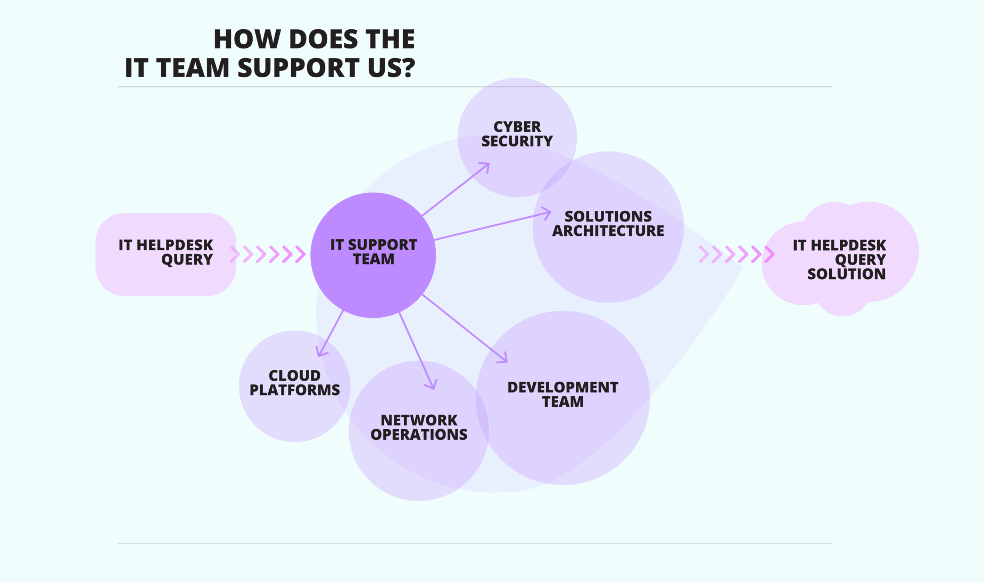
Some of the specific responsibilities of the IT team at UP Education are:
- Infrastructure management: The IT team is responsible for managing our hardware and software infrastructure, including servers, networks, and storage systems. This involves monitoring and maintaining these systems to ensure they are operating efficiently and securely.
- Software and application support: The IT team provides support for the various software applications used by staff and students, such as learning management systems, student information systems, and productivity software. They may also develop and maintain custom software solutions to meet specific institutional needs.
- Cybersecurity: The IT team is responsible for ensuring the security of our information systems and data. This involves implementing security measures, such as firewalls, anti-virus software, and access controls, as well as monitoring for and responding to security incidents.
- User support: The IT team provides support to staff and students who require assistance with technology-related issues. This may involve troubleshooting hardware and software problems, setting up and configuring devices, and providing training and guidance on the use of technology tools and applications.
- Technology planning and strategy: The IT team works with senior management to develop technology plans and strategies that support our goals and objectives. This may involve researching and evaluating new technologies, identifying opportunities for innovation and improvement, and developing plans for the implementation of new systems and tools.
Helpdesk
Your friend, the IT Helpdesk!
Whenever you have an IT issue — and after you have logged out and back in again AND restarted your computer 😉 — you can easily log a Helpdesk ticket.
Here are some great points to remember when you log a Helpdesk ticket to get some help with an IT issue:
- write enough detail and info as if you are speaking to someone that knows nothing about your computer/role or the situation you are talking about (Someone new to the team might pick it up, so they need a full picture of info.)
- include screenshots always
- be clear in what you what the outcome to be of the Helpdesk ticket
for example:
In the LMS, Online Horticulture L3 programme, there are currently x2 groups made for the April Part time intake.
There should only be one group, could you please delete one of the groups? (add a screenshot showing the 2 groups)
If we do all of the above, Helpdesk can respond quickly to our requests without needing to follow up for more information.
You can log a Helpdesk ticket in a number of way:
- Email: helpdesk@up.education
- Use the Support Portal: IT Helpdesk
- For urgent IT issues: call 0800 463 448
Your IT Responsibilities
- Using technology tools and software: we rely on a variety of technology tools and software applications to support teaching, learning, and administrative tasks. We have a responsibility to learn how these tools work and provide any input on new technology solutions that could be implemented.
- Providing technical support: as a tutor/team leader etc, you may be required to provide technical support to students and staff who require assistance with technology-related issues. This may involve troubleshooting basic hardware and software problems, setting up devices, and providing guidance on the use of technology tools and applications.
- Collaborating with IT teams: you may need to collaborate with the IT team to resolve issues, test new technology solutions, and provide feedback on the use of technology tools.
- Ensuring data privacy and security: we need to follow specific protocols for data privacy and security, such as ensuring that confidential information is not shared or stored improperly and that technology tools are used in a secure manner.
---> 🔵 CLICK to view the IT Policy Documents: BambooHR files
Cyber Security
![]()
Keeping our campuses cyber safe is all our responsibility. As well as the Cyber Security Awareness Programme, you will also receive regular Cyber Safety updates from the IT team, look out for these important emails.
---> 🔵 CLICK to get to the IT Notifications Team
One of the channels is Cyber Security Awareness Programme: this contains important information that needs to be read by all staff.
Generally, the Finance team is responsible for managing the financial operations of our company. This includes tasks such as budgeting, financial planning, accounting, and reporting.
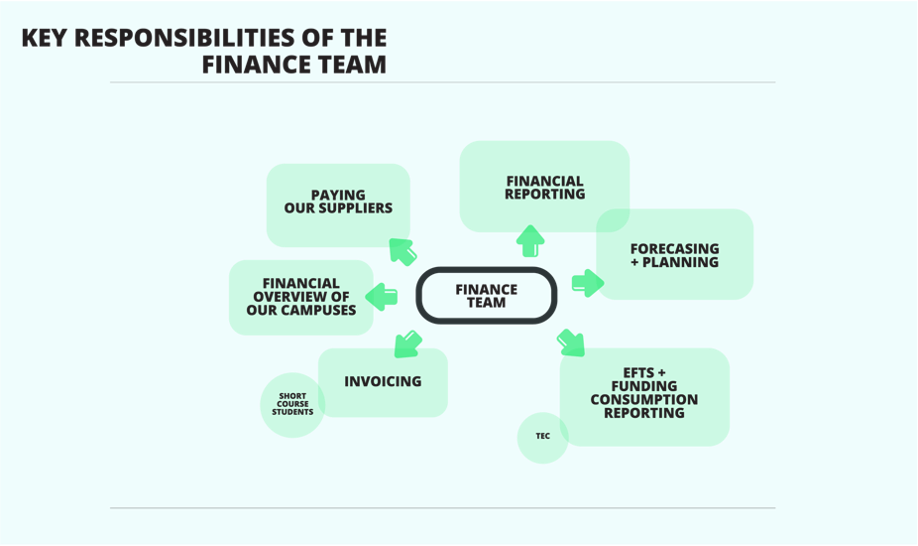
Some of the specific responsibilities of the Finance team are:
- Budgeting and financial planning: The Finance team will work with the senior management team to develop and manage our budgets and financial plans, which involves forecasting revenue and expenses, allocating resources, and identifying potential risks and opportunities.
- Accounting and financial reporting: The Finance team is responsible for maintaining accurate financial records and producing regular financial reports, such as profit and loss statements, balance sheets, and cash flow statements. These reports are used to monitor our financial performance and inform decision-making.
- Audit and compliance: The Finance team is responsible for ensuring that we comply with relevant laws and regulations, such as tax laws and financial reporting requirements. They may also work with external auditors to conduct audits of our financial statements.
- Financial management and strategy: The Finance team may work with senior management to develop financial strategies and plans to support our goals and objectives. This may involve analysing financial data and market trends, identifying potential investment opportunities, and assessing financial risks.
At NZMA, our Finance team covers the following:
- They regularly pay our suppliers
- They send invoices to suppliers, so they can pay us for any services provided. They have an overview of all money that comes in to our campuses, as they need to account for all money received and all money paid via bank accounts
- Each month they prepare Financial Reports for our Board and for each Campus Manager: these reports cover Profit & Loss, Key Statistics around enrolments, class sizes, staff numbers, trends etc.
- They report on EFTL and Funding consumption.
---> 🟣 READ MORE about EFTL and Funding below.
- They are required to forecast business profitability based on expected domestic and international enrolments. This can be challenging when you have multiple campuses, there are many 'pieces of the pie' in terms of money expected to come in and money expected to go out, to bring it together.
![]()
The Finance team process all staff reimbursement claims (Payroll does not do this).
If you need to purchase an item for your class or campus, please speak with your campus manager
EFTL: What are they?

(In the context of education) EFTL stands for Equivalent Full-Time Learner. It is a unit of measurement used by educational institutions in New Zealand to calculate student enrolment and funding.
One EFTL is equivalent to the workload of a full-time student for one academic year, which is typically 120 credits in New Zealand. Part-time students are calculated as a proportion of an EFTL based on the number of credits they are enrolled in.
In New Zealand, domestic students who are enrolled in government-subsidised tertiary education programmes can receive funding through the Tertiary Education Commission (TEC). The funding is based on the number of EFTL that the student is enrolled in and the level of study.
The TEC sets a maximum funding rate per EFTL, which is reviewed annually. This maximum rate is used to determine the amount of funding that educational institutions receive for each EFTL enrolled by a domestic student. The funding rate is set differently for different types of courses and levels of study. For example, the funding rate for undergraduate courses is typically higher than the funding rate for postgraduate courses.
The EFTL system is used to allocate funding for domestic students in New Zealand's tertiary education system, with the aim of providing equal access to education and supporting the country's social and economic development.

Funding:
In New Zealand, the Tertiary Education Commission (TEC) is responsible for allocating Equivalent Full-Time Student (EFTL) funding to tertiary institutes.
---> 🟣 READ MORE about TEC in Section: 4.3.7
The allocation process involves several steps:
- Enrolment Reporting: Tertiary institutions are required to report student enrolment data to the TEC. This includes the number of EFTL enrolled in each course and the level of study (e.g., undergraduate or postgraduate).
- Funding Categories: The TEC classifies courses into different funding categories based on their subject area and level of study. Each category has an associated funding rate.
- EFTL Calculation: The TEC calculates the total EFTL for each institution by multiplying the number of enrolled students in each course by the respective funding rate. This calculation is performed for each funding category.
- Funding Allocation: The TEC allocates funding to institutions based on the total calculated EFTL. The allocated funds are intended to cover the costs associated with delivering education and supporting students.
The TEC's goal in allocating EFTL funding is to ensure equitable distribution and support high-quality tertiary education across New Zealand. The funding received by each institution is typically used to cover operational expenses, staffing, infrastructure, and other resources necessary to deliver education and support students' learning experiences.
Withdrawals:
When a student withdraws from a programme of study in New Zealand, the educational institution (NZMA) is required to report the withdrawal to the TEC. The TEC will then adjust the funding for the institution based on the actual EFTL that the student was enrolled in up to the point of withdrawal. All reporting for NZMA to TEC is done through our registry and compliance team.
The TEC has specific rules for calculating the funding adjustment for withdrawn students. The calculation is based on the number of weeks the student was enrolled in the course and the date of withdrawal. The TEC also takes into account any fees or refunds associated with the withdrawal.
If a student withdraws from a course early in the academic year, the funding adjustment may be significant. However, if a student withdraws later in the year, the funding adjustment may be minimal, as the student has already been enrolled for a significant portion of the academic year.
The TEC funding adjustment for withdrawn students is designed to encourage educational institutions to provide appropriate support for students to complete their courses successfully. It is also intended to ensure that the government funding for tertiary education is being used effectively and efficiently.
